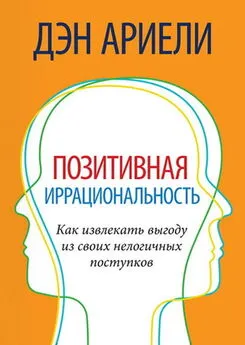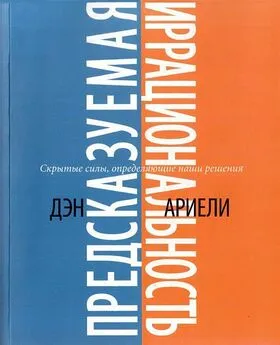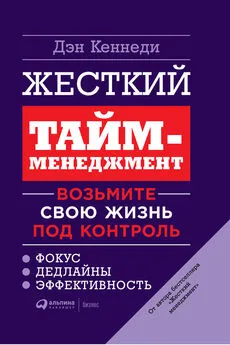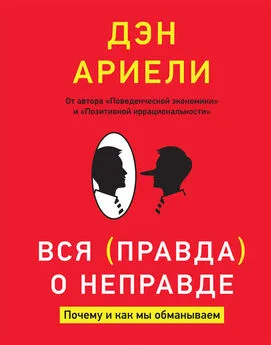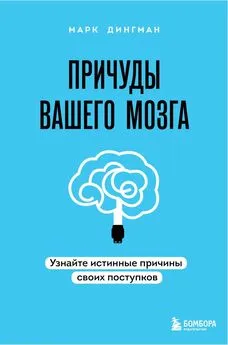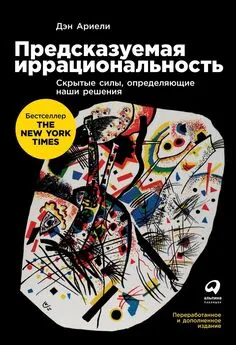Дэн Ариели - Позитивная иррациональность. Как извлекать выгоду из своих нелогичных поступков
- Название:Позитивная иррациональность. Как извлекать выгоду из своих нелогичных поступков
- Автор:
- Жанр:
- Издательство:Манн, Иванов и Фербер
- Год:2010
- Город:Москва
- ISBN:978-5-91657-120-2
- Рейтинг:
- Избранное:Добавить в избранное
-
Отзывы:
-
Ваша оценка:
Дэн Ариели - Позитивная иррациональность. Как извлекать выгоду из своих нелогичных поступков краткое содержание
Эта книга — продолжение захватывающего исследования странных поступков, совершаемых разумными людьми (в экономике и не только), начатого автором в книге «Предсказуемая иррациональность». Годы экспериментов в области поведенческой экономики отразились в увлекательном, серьезном и поучительном рассказе, на этот раз — о неожиданных выгодах, которые может дать наше «странное» поведение. А также о том, когда и почему высокие бонусы приводят к ухудшению результатов; как с гарантией сделать вашу работу бессмысленной, даже если вы ее очень любите; почему мы привыкаем к вещам, но не ко всем и не всегда.
Книга для всех, кто хочет узнать больше о скрытых силах, определяющих наше поведение, и принимать в дальнейшем лучшие решения.
Позитивная иррациональность. Как извлекать выгоду из своих нелогичных поступков - читать онлайн бесплатно ознакомительный отрывок
Интервал:
Закладка:
Daniel Kahneman, Jack Knetsch and Richard Thaler, «Anomalies: The Endowment Effect, Loss Aversion and Status Quo Bias», Journal of Economic Perspectives (1991).
Jack Knetsch, «The Endowment Effect and Evidence of Non reversible Indifference Curves», American Economic Review (1989).
Justin Kruger, Derrick Wirtz, Leaf Van Boven and T. William Altermatt, «The Effort Heuristic», Journal of Experimental Social Psychology (2004).
Ellen Langer, «The Illusion of Control», Journal of Personality and Social Psychology (1975).
Carey Morewedge, Lisa Shu, Daniel Gilbert and Timothy Wilson, «Bad Riddance or Good Rubbish? Ownership and Not Loss Aversion Causes the Endowment Effect», Journal of Experimental Social Psychology (2009).
Глава 4
Предубеждение против чужих идей: чем «мои» лучше «твоих»
Библиография:
Stephen Spiller, Rachel Barkan and Dan Ariely, «Not-Invented-By-Me: Idea Ownership Leads to Higher Perceived Value», manuscript Duke University (2010).
Zachary Shore, «Blunder: Why Smart People Make Bad Decisions», Bloomsbury , USA (2008).
Дополнительные источники:
Ralph Katz and Thomas Allen, «Investigating the Not Invented Here (NIH) Syndrome: A Look at the Performance, Tenure and Communication Patterns of 50 R&D Project Groups», R&D Management (1982).
Jozef Nuttin Jr., «Affective Consequences of Mere Ownership: The Name Letter Effect in Twelve European Languages», European Journal of Social Psychology (2006).
Jon Pierce, Tatiana Kostova and Kurt Dirks, «The State of Psychological Ownership: Integrating and Extending a Century of Research», Review of General Psychology (2003).
Jesse Preston and Daniel Wegner, «The Eureka Error: Inadvertent Plagiarism by Misattributions of Effort», Journal of Personality and Social Psychology (2007).
Michal Strahilevitz and George Loewenstein, «The Effect of Ownership History on the Valuation of Objects», Journal of Consumer Research (1998).
Глава 5
Поговорим о мести: что заставляет нас искать справедливости?
Библиография:
Dan Ariely, «Customers’ Revenge 2.0», Harvard Business Review (2007).
Ayelet Gneezy and Dan Ariely, «Don’t Get Mad, Get Even: On Consumers’ Revenge», manuscript Duke University (2010).
Keith Jensen, Josep Call and Michael Tomasello, «Chimpanzees are Vengeful but not Spiteful», Proceedings of the National Academy of Sciences (2007).
Kathleen Mazor, George Reed, Robert Yood, Melissa Fischer, Joann Baril and Jerry Gurwitz, «Disclosure of Medical Errors: What Factors Influence How Patients Respond?», Journal of General Medicine (2006).
Dominique de Quervain, Urs Fischbacher, Valerie Treyer, Melanie Schellhammer, Ulrich Schnyder, Alfred Buck and Ernst Fehr, «The Neural Basis of Altruistic Punishment», Science (2004).
Albert Wu, I-Chan Huang, Samantha Stokes and Peter Pronovost, «Disclosing Medical Errors to Patients: Its Not What You Say, its What They Hear», Journal of General Internal Medicine (2009).
Дополнительные источники:
Robert Bies and Thomas Tripp, «Beyond Distrust: ‘Getting Even’ and the Need for Revenge», Trust in Organizations: Frontiers in Theory and Research [Editors: Roderick Kramer and Tom Tyler], Thousand Oaks , CA: Sage Publications (1996).
Ernst Fehr and Colin F. Camerer, «Social Neuroeconomics: The Neural Circuitry of Social Preferences», TRENDS in Cognitive Sciences (2007).
Marian Friestad and Peter Wright, «The Persuasion Knowledge Model: How People Cope with Persuasion Attempts», Journal of Consumer Research (1994).
Alan Krueger and Alexandre Mas, «Strikes, Scabs and Tread Separations: Labor Strife and the Production of Defective Bridgestone/Firestone Tires», Journal of Political Economy (2004).
Ken-ichi Ohbuchi, Masuyo Kameda and Nariyuki Agarie, «Apology as Aggression Control: Its Role in Mediating Appraisal and Response to Harm», Journal of Personality and Social Psychology (1989).
Seiji Takaku, «The Effects of Apology and Perspective Taking on Interpersonal Forgiveness: A Dissonance-Attribution Model of Interpersonal Forgiveness», Journal of Social Psychology (2001).
Часть 2
Неожиданные способы, которыми мы отвергаем логику дома
Глава 6
Адаптация: почему мы привыкаем к вещам, но не ко всем и не всегда
Библиография:
Henry Beecher, «Pain in Men Wounded in Battle», Annals of Surgery (1946).
Philip Brickman, Daniel Coates and Ronnie Janoff-Bulman, «Lottery Winners and Accident Victims: Is Happiness Relative?», Journal of Personality and Social Psychology (1978).
Andrew Clark, «Are Wages Habit-Forming? Evidence from Micro Data», Journal of Economic Behavior & Organization (1999).
Reuven Dar, Dan Ariely and Hanan Frenk, «The Effect of Past-Injury on Pain Threshold and Tolerance», Pain (1995).
Paul Eastwick, Eli Finkel, Tamar Krishnamurti and George Loewenstein, «Mispredicting Distress Following Romantic Breakup: Revealing the Time Course of the Affective Forecasting Error», Journal of Experimental Social Psychology (2008).
Leif Nelson and Tom Meyvis, «Interrupted Consumption: Adaptation and the Disruption of Hedonic Experience», Journal of Marketing Research (2008).
Leif Nelson, Tom Meyvis and Jeff Galak, «Enhancing the Television-Viewing Experience through Commercial Interruptions», Journal of Consumer Research (2009).
Tibor Scitovsky, «The Joyless Economy: The Psychology of Human Satisfaction», Oxford University Press, USA (1976).
David Schkade and Daniel Kahneman, «Does Living in California Make People Happy? A Focusing Illusion in Judgments of Life Satisfaction», Psychological Science (1998).
Дополнительные источники:
Dan Ariely, «Combining Experiences Over Time: The Effects of Duration, Intensity Changes and On-Line Measurements on Retrospective Pain Evaluations», Journal of Behavioral Decision Making (1998).
Dan Ariely and Ziv Carmon, «Gestalt Characteristics of Experiences: The Defining Features of Summarized Events», Journal of Behavioral Decision Making (2000).
Dan Ariely and Gal Zauberman, «Differential Partitioning of Extended Experiences», Organizational Behavior and Human Decision Processes (2003).
Shane Frederick and George Loewenstein, «Hedonic Adaptation», Well-Being: The Foundations of Hedonic Psychology [Daniel Kahneman, Ed Diener and Nor-bert Schwarz], New York: Russell Sage Foundation (1999).
Bruno Frey, «Happiness: A Revolution in Economics», MIT Press, Cambridge, MA and London, UK (2008).
Dan Gilbert, «Stumbling on Happiness», Knopf (2006).
Jonathan Levav, «The Mind and the Body: Subjective Well-Being in an Objective World», Do Emotions Help or Hurt Decision Making? [Editors: Kathleen Vohs, Roy Baumeister and George Loewenstein], New York: Russell Sage (2007).
Sonja Lyubomirsky, «Hedonic Adaptation to Positive and Negative Experiences», [Editor: Susan Folkman] Oxford Handbook of Stress, Health and Coping. New York: Oxford University Press (2010).
Sonja Lyubomirsky, «The How of Happiness: A Scientific Approach to Getting the Life You Want», Penguin Press (2007).
Sonja Lyubomirsky, Kennon Sheldon and David Schkade, «Pursuing Happiness: The Architecture of Sustainable Change», Review of General Psychology (2005).
Глава 7
Hot or Not: адаптация, ассортативное скрещивание и рынок красоты
Библиография:
Leonard Lee, George Lowenstein, James Hong, Jim Young and Dan Ariely, «If Tm Not Hot, Are You Hot or Not? Physical-Attractiveness Evaluations and Dating Preferences as a Function of One’s Own Attractiveness», Psychological Science (2008).
Дополнительные источники:
Ed Diener, BrianWolsic and Frank Fujita, «Physical Attractiveness and Subjective Well-Being», Journal of Personality and Social Psychology (1995).
Paul Eastwick and Eli Finkel, «Speed-Dating As a Methodological Innovation», The Psychologist (2008).
Paul Eastwick, Eli Finkel, Daniel Mochon and Dan Ariely, «Selective vs. Unselective Romantic Desire: Not All Reciprocity is Created Equal», Psychological Science (2007).
Elizabeth Epstein and Ruth Guttman, «Mate Selection in Man: Evidence, Theory and Outcome», Social Biology (1984).
Raymond Fisman, Sheena Iyengar, Emir Kamenica and Itamar Simonson, «Gender Differences in Mate Selection: Evidence from a Speed Dating Experiment», Quarterly Journal of Economics (2006).
Guenter Hitsch, Ali Horta^su and Dan Ariely, «What Makes You Click? — Mate Preferences in Online Dating», manuscript University of Chicago (2010).
Глава 8
Когда рынок терпит поражение: пример онлайновых свиданий
Библиография:
Jeana Frost, Zoe Chance, Michael Norton and Dan Ariely, «People are Experience Goods: Improving Online Dating with Virtual Dates», Journal of Interactive Marketing (2008).
Fernanda Viegas and Judith Donath, «Chat Circles», Paper presented at Human Factors in Computing Systems (1999).
Дополнительные источники:
Steven Bellman, Eric Johnson, Gerald Lohse and Naomi Mandel, «Designing Marketplaces of the Artificial with Consumers in Mind: Four Approaches to Understanding Consumer Behavior in Electronic Environments», Journal of Interactive Marketing (2006).
Rebecca Hamilton and Debora Thompson, «Is There a Substitute for Direct Experience? Comparing Consumers’ Preferences after Direct and Indirect Product Experiences», Journal of Consumer Research (2007).
John Lynch and Dan Ariely, «Wine Online: Search Costs Affect Competition on Price, Quality and Distribution», Marketing Science (2000).
Michael Norton, Joan DiMicco, Ron Caneel and Dan Ariely, «Anti-Group Ware and Second Messenger», ВТ Technology Journal (2004).
Глава 9
Сопереживание и эмоции: почему мы помогаем одному и не помогаем многим
Библиография:
Deborah Small and George Loewenstein, «Helping a Victim or Helping the Victim: Altruism and Identifiability», Journal of Risk and Uncertainty (2003).
Deborah Small and George Loewenstein, «The Devil You Know: The Effects of Identifiability on Punishment», Journal of Behavioral Decision Making (2005).
Deborah Small, George Loewenstein and Paul Slovic, «Sympathy and Callousness: The Impact of Deliberative Thought on Donations to Identifiable and Statistical Victims», Organizational Behavior and Human Decision Processes (2007).
Читать дальшеИнтервал:
Закладка:
